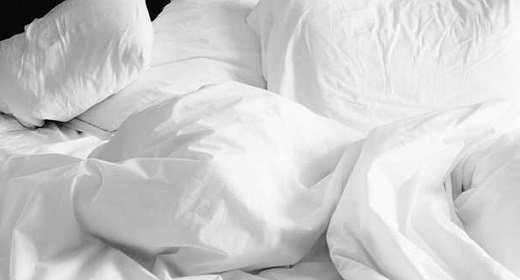If you have anxiety, you probably already know that it can get in the way of sleep…
But, the relationship between the two isn’t clear cut. That’s because one can cause the other and vice versa. So, to help you understand how they’re associated better, we explain on how does anxiety affect sleep.
Which Comes First: Sleep Disorder or Anxiety Disorder?
Sleep problems and mood disorders like anxiety are intricately wound together. People with anxiety can often experience sleeping issues. And, anyone who has sleep problems can likewise develop anxiety.
Which problem comes first often varies from person to person. That’s because each individual experiences a sleep or anxiety disorder differently.
Typically, you may experience sleep disorders without any anxiety disorder. However, if you happen to have an anxiety disorder, it almost always causes disordered sleep, even it not all the time (10).
That said, sleep disorders can also cause anxiety because lack of sleep has a negative impact on your mood (11).
In fact, when well-rested individuals were compared with their sleep deprived peers, those who slept less reported being more tense, angry, and on-edge. This was due to their elevated stress hormones, something that the well-rested participants didn’t have.
On the other hand, Individuals who have been diagnosed with an anxiety disorder reported sleeping issues more often than those who did not suffer from any mood disorder.
Why? We will explain the correlation in more detail below.
Sleep and Anxiety: How Does Lack of Sleep Cause Anxiety?
Trying to figure out whether your anxiety disorder caused your sleep problem or vice versa is much like asking whether the chicken or the egg came first.
The truth is, anxiety will cause sleeping problems the same way that lack of sleep will cause anxiety.
This is because when you’re exhausted you have stronger emotional responses to stimuli than you normally would.
Lab studies and recent research has shown that people who suffer from chronic insomnia are more likely to develop an anxiety disorder, panic disorder, or social anxiety, than an individual who sleeps well at night (10).
That’s because lack of sleep can cause anxiety for reasons other than just your internal stress responses and their physical manifestations. Lack of sleep also causes poor performance at work, high blood pressure, and weight gain.
Poor performance at work from sleep deprivation can make you devalue yourself. As a result, it can lead to negative self-talk and loss of self-confidence which increases anxiety (10).
Similarly, high blood pressure from sleep loss can cause your body to experience more physical stress. This makes you quicker to react angrily, which in turn increases anxiety and tension within your relationships.
Chronic sleeplessness can likewise cause you to gain weight because you eat more and move less. As a result, the extra pounds can increase anxiety, especially for individuals who have a fragile self-esteem (10).
Between the physical and emotional responses to sleep deprivation, anxiety and other mood disorders can be triggered and exacerbated by sleep loss.
Unfortunately sleep loss not only causes anxiety, but anxiety causes sleep loss making the combination a terrible cycle that can snowball. As such, it is hard to break without medical intervention.
Anxiety and Sleep: How Does Anxiety Affect Sleep?
On the other hand, anxiety negatively impacts your ability to sleep. And, lack of sleep negatively impacts your anxiety (8).
Anxiety induces sleep problems for undiagnosed individuals at least one night of the week. And, more than half of diagnosed individuals say they often cannot sleep several nights of the week as a result of their anxiety issues.
Why does this happen?
That’s because when someone is suffering from an anxiety disorder, panic disorder, or phobia, their body initiates a stress response. This stress response has a stimulating effect on the body and mind (1, 4, 5, 7).
Physical stress responses like an increased heart rate, shallow breathing, and nausea makes it nearly impossible to fall asleep until your body calms itself.
Meanwhile, the internal, hormonal stress responses that drive these physical manifestations also make it hard for the body to fall asleep, especially when your cortisol levels are high (9).
Since anxiety makes it hard to sleep, seeking treatment can help you rest better and manage your condition.
Finding a remedy is important because not only does anxiety make it hard to sleep, but a severe lack of sleep can make you even more anxious.
Like everyone else, you have probably experienced nights where you’re lying awake in bed watching the hours tick by. Once that happens, you start to worry about being tired tomorrow morning, possibly making more mistakes at work or forgetting your lunch because you wake up late.
Soon enough your alarm is going off. It’s morning and you didn’t much sleep.
The problem is when you are anxious about something, you often won’t be able put your finger on it. This leaves you lying awake in bed. As a result, you miss out on more sleep due to your body’s stress response (1, 4, 5, 7, 9).
While you would think that being tired the next day would make it easier for you to sleep the next night, that often isn’t the case. Instead, you will be left on edge from your exhaustion which could trap you in a cycle of sleep deprivation and racing thoughts.
Types of Anxiety Disorders That Affect Sleep
1. Generalized Anxiety Disorder
Generalized anxiety disorder (GAD) is a severe mood disorder that is typically diagnosed by a psychologist, therapist, or a psychiatrist (1).
When a person is suffering from generalized anxiety disorder, they experience excessive worrying about situations that may or may not be occurring in their lives. People with generalized anxiety disorder anticipate issues in the future with their money, their family, or their relationships.
Unfortunately, the condition affects almost seven million adults in the United States. More importantly, it is commonly misdiagnosed as a panic disorder (1).
That said, the symptoms of generalized anxiety disorder differentiate it from panic disorders and social anxiety disorders. GAD can leave you feeling tired, irritable, tense, sleep-deprived and often produces physical anxiety manifestations.
One physical symptom of generalized anxiety disorder is the feeling of a heavy chest or breathlessness even when you are stationary. This can make it hard for individuals to fall asleep or stay asleep because of the persistent racing thoughts they have (1).
Similarly, generalized anxiety disorder can also produce restless sleep and unsatisfying sleep. This is because the individual awakes frequently throughout the night, often with their hearts racing. This makes it difficult to fall back asleep (2).
Treatment for anxiety disorder typically includes a mood stabilizer, antidepressant, and behavioral therapy.
2. Obsessive Compulsive Disorder (OCD)
Obsessive compulsive disorder is a chronic condition where an individual has obsessive thought patterns and compulsive behaviors that they feel obligated to repeat over and over (3). These obsessive thoughts often cause the individual anxiety or depression.
Some pervasive thoughts include an obsessive fear of germs, obsessive fear of disarray, and other obsessive thoughts that cause the individual stress and initiate compulsive behaviors.
Unfortunately, these thoughts can make it difficult for an individual to lead a normal life, be it at work, school, and in social environments.
Meanwhile, compulsions are the behaviors that someone carries out in a response to the obsessive thoughts they are having. For example, an obsessive fear of germs can lead to compulsive hand-washing (3).
An individual suffering from OCD typically spends an hour or more carrying out these compulsions in response to obsessive thoughts.
As a result, they may suffer from sleep loss or chronic insomnia. One reason may be because they cannot lay down without the obsessive thoughts. And, they tend to get up frequently to indulge the compulsive behaviors through the night.
It’s worth noting that OCD is frequently paired with depression, anxiety, and other psychiatric disorders. And, treatment for OCD may not eliminate symptoms completely.
That said, an individual with this disorder is typically placed on medication. In addition, they attend psychotherapy to minimize the intrusiveness of this condition.
SSRI medications that are used for anxiety disorder and depression in conjunction with therapy works well for individuals suffering from OCD (3). These treatments help the individual control some of the obsessive thoughts, this in turn minimizes their compulsive behavior.
3. Panic Disorder
As we mentioned earlier, generalized anxiety disorder is often misdiagnosed as a panic disorder. However, panic disorder is very different from generalized anxiety disorder. And, is typically episodic (4).
Generalized anxiety disorder is constant worrying. But, panic disorder is a seemingly out-of-nowhere state of extreme fear.
Also, panic disorder manifests itself physically when an individual having an attack will have a racing heart, chills, dizziness, nausea, and other physical responses to extreme fear (4).
It can likewise cause an individual to avoid areas and situations where they have experienced a panic attack before. This tends to get in the way of leading a normal life.
Just as importantly, an individual suffering from panic disorder will frequently miss out on sleep. At times, they may opt to forgo sleep completely due to a sense of impending doom (4).
This is because the panic state may be triggered by dreams that incorporate a sense of terror or a location associated with a previous panic attack.
As far as treatment goes, a psychiatrist may prescribe benzodiazepine or SSRI medication to control panic attacks in conjunction with psychotherapy (4).
For individuals suffering from panic disorder, the cognitive behavioral therapy they undergo attempts to teach them new ways to react and think about the feelings they experience with a panic attack. The goal of which is to reduce the reaction to a panic attack, such that the episode is less stressful and is shorter in duration (4).
4. Social Anxiety Disorder
Social anxiety disorder affects over fifteen million Americans. It is also commonly misconstrued as extreme shyness (5).
Social anxiety disorder when extreme enough, can be confused with panic disorder. However, this disorder carries with it an intense fear of being negatively viewed or rejected in front of peers, or during a performance.
As a result, people with social anxiety disorder often avoid social interaction or situations where they would have to be in front of people and not show the physical manifestations of their anxiety.
Some of the symptoms of social anxiety disorder include rapid heart rate, sweating, shaking, and other signs of physical panic when in a social setting, even if it’s a dinner with friends where they know they aren’t being judged (5).
As such, social anxiety can leave people missing out on hours of sleep per night thinking about a presentation they have to do the next day, an interview they must attend, or bad news they must deliver.
This irrational fear of being judged and leads to avoidance of situations where individuals would have to be in front of people.
The primary treatment for social anxiety disorder consists of cognitive behavioral therapy that attempts to teach the individual how to react to symptoms of panic when in a social situation (5).
If cognitive behavioral therapy is not enough, a selective serotonin re-uptake inhibitor is often prescribed in conjunction with therapy.
Sadly, less than 5% of those diagnosed with this condition seek treatment. But, if you’re one of the individuals lying awake at night, worried about that presentation the next morning, it’s worth noting that therapy is an incredibly successful treatment for social anxiety disorder.
5. Post-Traumatic Stress Disorder (PTSD)
Post-traumatic stress disorder or PTSD is one of the least misdiagnosed disorders. That’s because it is characterized as an extreme fear that persists long after a traumatic or dangerous situation has occurred (6).
It’s worth noting that PTSD can be acute or chronic for individuals who have experienced a trauma.
When someone is suffering from PTSD, they may avoid events and places that remind them of the traumatic experience. This can result in someone drastically shifting their routine (6).
One of the most common events resulting in PTSD is living through a major car accident. Here, the person suffered through the accident often avoids driving a car or even traveling by car until they receive treatment (6).
Unfortunately, PTSD can result in feeling on edge, make it difficult to sleep, and lead to angry outbursts when you get in a state of fear.
As such, it may result in terrifying dreams that cause an individual to stay awake at night or try to forgo sleep completely. Sadly, this makes daytime episodes far worse.
That said, PTSD is treated with therapy and medication. However, many medications for this condition are not FDA approved. The medications that are often prescribed for PTSD seek to treat the symptoms which lessens the severity of the episodes in individual experiences instead of the cause.
So, when an individual awakes from a PTSD related dream, proper medication can make the event less stimulating to the body. Thus, allowing the individual to fall sleep sooner.
If you are suffering from PTSD treatment is one of the only ways to alleviate the disruption of this disorder.
6. Phobias
Phobias are a type of anxiety disorder that are specific to one situation. Some examples include claustrophobia which is the fear of closed spaces, and acrophobia, the fear of heights.
When extreme enough, a specific phobia can be confused with a panic disorder. However, it is important to note that a phobia relates to one specific trigger (7).
People react to phobias with trembling, shortness of breath, and rapid heartbeat. Typically, phobias are diagnosed in adults. But, they can likewise be present throughout an individual’s life.
Cognitive behavioral therapy and exposure therapy are the most common treatments for an individual suffering from phobias. But, SSRI medications can also help the physical manifestations (7).
It is likewise important to note that phobias can hamper an individual’s ability to sleep. This is due to terrifying dreams, and excessive anxiety that can happen due to the possibility of a dream being related to their phobia.
More importantly, if a severe phobia is left untreated it may cause you to lose so much sleep that you get to the point of experiencing hallucinations (7).
















































